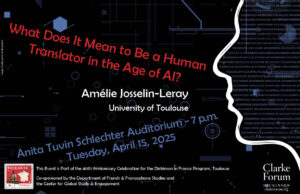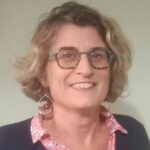 Anita Tuvin Schlechter Auditorium, 7 p.m.
Anita Tuvin Schlechter Auditorium, 7 p.m.
What Does It Mean to Be a Human Translator in the Age of AI?
Amélie Josselin-Leray, University of Toulouse
The advent of generative AI in the last two years has been considered as a matter of considerable concern in the field of language-related trades, and in particular in the field of translation and interpreting: will AI take over the jobs of translators and interpreters? In this presentation, Josselin-Leray will argue in favor of an even more pressing need to train future translators and show how the way to train translators has evolved in the last two decades, based on her 17-year-long experience as a trainer in a programme belonging to the EMT (European Master’s programmes in Translation) network, under the umbrella of the Directorate General for Translation at the European Commission. Over the last few decades, translators have been successively faced with new technologies such as Computer-Assisted Tools (also called translation memories) or Neural Machine Translation. Now they have to face Large Language Models (LLMs). To be able to integrate successfully the labour market which is more and more highly technologized, young language professionals thus need to acquire specific skills (post-editing, writing effective AI prompts…) which she will discuss in detail. To do so, Josselin-Leary will rely partly on the updated competence framework designed by the EMT network.
This program is sponsored by the Clarke Forum for Contemporary Issues and co-sponsored by the Department of French & Francophone Studies and the Center for Global Study & Engagement.
This event is part of the 40th anniversary celebration for our Dickinson-in-Toulouse program.
Topic overview written by Shayna Herzfeld ’25
Biography (provided by the speaker)
 Amélie Josselin-Leray is full professor in linguistics and translation studies at the University of Toulouse Jean Jaurès, France, where she currently is the head of the Translation & Interpreting Department (D-TIM). Prior to this, she was associate professor for fourteen years in the English Department. She is in charge of the master’s programme in translation studies – which is part of the European Master’s in Translation network and which trains where future professional translators and interpreters, including sign language interpreters and deaf translators. After working as a lexicographer and reviser for the Canadian Bilingual (French/English) Dictionary Project at the University of Ottawa for two years in the late nineties, she completed a Ph.D. in translation and multilingual lexicology & terminology at the University Lyon 2, France in 2005. Within the research lab CLLE, under the umbrella of the French National Center for Research (CNRS), her research focuses mainly on lexicography, terminology and corpus linguistics. Her research interests have recently shifted to the use of dictionaries, term banks and translation technologies within the translation process, to the study of crowdsourced and collaborative dictionaries and to the study of digital lexical resources for French sign language.
Amélie Josselin-Leray is full professor in linguistics and translation studies at the University of Toulouse Jean Jaurès, France, where she currently is the head of the Translation & Interpreting Department (D-TIM). Prior to this, she was associate professor for fourteen years in the English Department. She is in charge of the master’s programme in translation studies – which is part of the European Master’s in Translation network and which trains where future professional translators and interpreters, including sign language interpreters and deaf translators. After working as a lexicographer and reviser for the Canadian Bilingual (French/English) Dictionary Project at the University of Ottawa for two years in the late nineties, she completed a Ph.D. in translation and multilingual lexicology & terminology at the University Lyon 2, France in 2005. Within the research lab CLLE, under the umbrella of the French National Center for Research (CNRS), her research focuses mainly on lexicography, terminology and corpus linguistics. Her research interests have recently shifted to the use of dictionaries, term banks and translation technologies within the translation process, to the study of crowdsourced and collaborative dictionaries and to the study of digital lexical resources for French sign language.
Related Links
EMT competence Framework https://commission.europa.eu/news/updated-version-emt-competence-framework-now-available-2022-10-21_en
Machine Translation Literacy https://fr.video.search.yahoo.com/search/video?fr=mcafee&p=machine+translation+literacy&type=E210FR91082G0#id=1&vid=d0d44a67969caf1218617de4d7209e52&action=click
Statements on AI in Translation (subtitlers) https://avteurope.org/
Interview I gave (in French) https://exploreur.univ-toulouse.fr/traduire-sans-trahir-quand-lia-sen-mele
A warning in 2021 from the Guardian: https://www.theguardian.com/tv-and-radio/2021/nov/14/where-have-all-the-translators-gone
